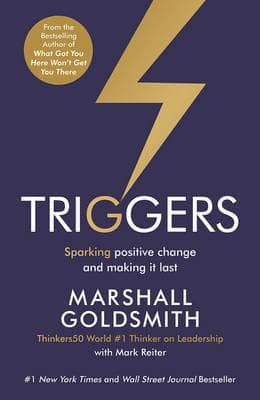Triggers by Marshall Goldsmith: Book Review, Summary, Notes, Lessons

Triggers Review
Solid book based on practical experience and foundations. I first heard about this book on the Cortex Podcast Book Club.
I was intrigued that the author, an executive coach, only got paid after working with his clients for up to 2 years if, and only if, the people around them confirmed that the change the client was seeking to make had happened… Wow – talk about putting your money where your mouth is. That is master positioning and a signal of confidence in your techniques.
The book reflects his positing with understated confidence. I found the ‘Daily Questions’ section the most impactful and I have my own set of daily questions that I’ve answered every day in 2019 so far.
The list of flaws in change thinking is required reading for anyone who has tried to improve themselves. I urge you to honestly ask yourself if you fall into any of the 15 traps – I fall for at least 9 of them.
The book drags a little towards the end but there is more than enough insight here to be worth the time and price.
Fun Fact the author also wrote the title of the favourite book I’ve never read – ‘What Got You Here Won’t Get You There’.
Triggers Book Notes
Flaws in change thinking:
1. If I understand I will do
2. I have willpower and won’t give into temptation
3. Today is a special day
4. At least I’m better than _ _ _ _
5. I shouldn’t need help and structure – contempt for simplicity, instruction, follow up and our faith we can succeed by ourselves
6. I won’t get tired and my enthusiasm will not fade
7. I have all the time in the world
8. I won’t get distracted and nothing unexpected will occur
9. A sudden epiphany will change my life
10. My change will be permanent and I will never have to worry again
11. Eliminating old problems will not bring on new problems
12. Effort will be fairly rewarded
13. No one is paying attention to me
14. If I change I am inauthentic
15. I have the wisdom to assess my own behaviour
Change is based on the Environment
Identifying Triggers
- Evidence
- Relevance
- Consequence
- Action
A behavioural trigger is any stimulus that impacts our behaviour
- Direct and indirect
- Internal or external
- Conscious or unconscious
- Anticipated or unexpected
- Encouraging or discouraging
- Productive or counterproductive
Matrix of:
– Encouraging – Discouraging
– Productive – Counterproductive
Choose a behavioural goal. List people and situations that influence performance. Chart on the matrix.
Instead of the trigger loop: cue, behaviour, reward.
Trigger -> impulse -> awareness-> choice -> behaviour
Situational Leadership
- Directing
- Coaching
- Supporting
- Delegating
Controlling the environment
- Anticipation
- Avoidance
- Adjustment
Behavioural Change Options
Positive vs Negative and Change vs Keep.
- Creating
- Preserving
- Eliminating
- Accepting
What do we need to eliminate? Is a more empowering question than what’s wrong.
Active Engaging Questions
Coaching Magic Moves
- Apologising
- Asking for help
- Optimism
- Active Questions
Not how happy were you – but did you do your best to be happy…
- Did I do my best to set clear goals today?
- Did I do my best to make progress towards my goals today?
- Did I do my best to find meaning today?
- Did I do my best to be happy today?
- Did I do my best to build positive relationships today?
- Did I do my best to be fully engaged today?
Add own active questions and ask each day scoring out of 10 and averaging out. Key is to focus on effort not achievement. Add your own related to your goals.
Am I willing, at this time, to make the investment required to make a positive difference on this topic?
Empty boat and make a positive difference.
Don’t blame others and don’t prove how smart or right we are.
We don’t get better without structure
Use structure to overcome ego depletion. Reduce the decisions you need to make.
We need help when we’re least likely to get it. Act as if constantly being tested…
As required use hourly questions.
Become the trigger for you and others.